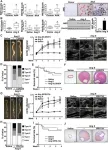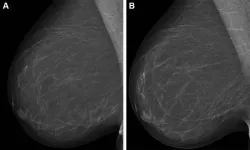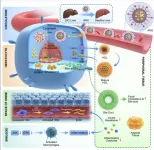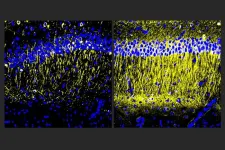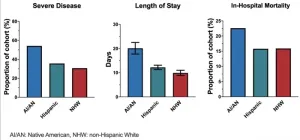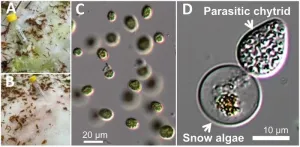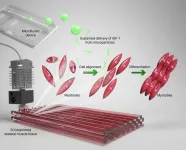(Press-News.org) Sleep is a critical part of a child’s overall health, but it can also be an important factor in the way they behave.
According to a new study from the Youth Development Institute at University of Georgia, getting enough sleep can help children combat the effects of stressful environments.
“Stressful environments are shown to make adolescents seek immediate rewards rather than delayed rewards, but there are also adolescents who are in stressful environments who are not impulsive,” said lead author Linhao Zhang, a fourth-year doctoral student in UGA’s College of Family and Consumer Sciences. “We looked at what explains that link and what makes some people differ from others. One mechanism we found is sleep.”
Researchers analyzed data from the Adolescent Brain Cognitive Development Study, a multi-year brain development study funded by the National Institutes of Health. Using information from 11,858 children from 9-10 years old, they found that lack of sleep and long sleep latency—the amount of time it takes to get to sleep—had a significant link to impulsive behaviors down the line.
Sleep problems, such as sleep latency (the time it takes an individual to fall asleep) and impulsive behaviors, were checked at multiple time points over the course of two years. When children got less than the recommended nine hours of sleep or took more than 30 minutes to get to sleep, there was a strong link to impulsive behaviors later down the line. Some of these behaviors included acting without a plan, seeking thrills or sensations, and lacking perseverance.
Sleep was a mediator between these actions, however, and when sleep problems were absent during the study, impulsivity was also less likely to be observed in the future.
Neurological hyperconnectivity, wherein the adolescents’ brains remained very active even when they were not actively engaged in tasks, also played a role, Zhang said. This study looked at the default mode network, a brain network related to goal-directed behaviors. When this network was hyperactive during resting-state, it could exacerbate the link between stressful environments, sleep and impulsivity. This connection could be linked to ADHD, which Zhang would like to explore in future studies.
“We can look at the default mode network and emotional regulation regions,” Zhang said. “It’s also possible that this hyperactivity and ADHD are highly correlated, so in a future study, we could test that in a more clinical setting. That could have great implications on intervention or counseling programs.”
These findings not only highlight sleep’s role in cognitive and behavioral development, but could also inform low-cost interventions to aid in the psychological development of children facing at-home stressors, Zhang said.
“If you want to develop interventions for people in stressful environments, it’s very costly, and sometimes it needs generational work to change,” Zhang said. “Sleep is a modifiable behavior, however, and these changes can be cost-efficient.”
Zhang said that too little sleep can be an issue even outside stressful environments. For example, teenagers often have a circadian rhythm that is geared toward staying up later and sleeping in, but early school start times and late nights completing homework can throw off that rhythm.
“A lot of adolescents don’t have enough time to sleep, and they are sleep deprived,” Zhang said. “This study shows why it is important to promote longer sleep duration by delaying school start times or establishing routines so that adolescents know, ‘OK, after this event, I’m going to bed.’”
Establishing these routines, no matter the environment, can create healthier patterns and reduce the time it takes to get to sleep. It’s also vital to act early when developing sleep habits, Zhang said.
“For people who may be in disadvantaged environments, if we can provide some strategies that help sleep, it can have a positive impact, especially for adolescents that are at such a critical developmental stage for their brain development.”
END
More sleep could reduce impulsive behavior in children
UGA study found that improved sleep can reduce environmental stressors’ negative influence on behavior
2023-08-29
ELSE PRESS RELEASES FROM THIS DATE:
New study sheds light on the role of Wnt/β-catenin signaling in abdominal aortic aneurysm
2023-08-29
Abdominal aortic aneurysm (AAA), a common degenerative vascular disease, particularly afflicts men over the age of 60, with up to 8% affected. Characterized by the abnormal dilation of the abdominal aorta, AAA risks a potentially fatal rupture. Despite increasing research efforts, effective pharmaceutical strategies to curb aneurysm growth remain elusive.
In a study published in the journal of Genes & Diseases, researchers from Sant Pau Hospital Research Institute and Biomedical Research Institute Sant Pau scrutinized the Wnt signaling pathway's deregulation in human abdominal aortic aneurysm (AAA). This ...
Combining AI models improves breast cancer risk assessment
2023-08-29
OAK BROOK, Ill. – Combining artificial intelligence (AI) systems for short- and long-term breast cancer risk results in an improved cancer risk assessment, according to a study published in Radiology, a journal of the Radiological Society of North America (RSNA).
Most breast cancer screening programs take a one-size-fits-all approach and follow the same protocols when it comes to determining a woman’s lifetime risk of developing breast cancer. Using mammography-based deep learning models may improve the accuracy of breast cancer risk assessment and can also lead to earlier ...
Anionic nanogel delivers effective anti-obesity drug to mouse livers
2023-08-29
An anti-obesity drug can be delivered selectively to the liver using a nanogel-based carrier, according to a study. Synthetic thyroid hormone mimics are promising treatments for metabolic diseases including metabolic dysfunction-associated steatohepatitis (MASH), high cholesterol, type 2 diabetes, and inflammatory liver disease; however, the molecules are not highly bioavailable or potent, which are necessary to see significant weight loss. S. Thayumanavan and colleagues designed a nanogel-based carrier with anionic moieties on the surface ...
Australia’s Nuclear Science and Technology Organisation (ANSTO) selects Symplectic Elements to enable comprehensive research management
2023-08-29
Digital Science, a technology company serving stakeholders across the research ecosystem, is pleased to announce that Australia’s Nuclear Science and Technology Organisation (ANSTO) has chosen Symplectic Elements from Digital Science’s flagship products to advance awareness of its world-class research.
ANSTO is the home to some of Australia’s most significant national infrastructure for research. Thousands of scientists from industry and academia benefit from gaining access to ANSTO’s ...
Molecule reduces inflammation in Alzheimer’s models
2023-08-29
Though drug developers have achieved some progress in treating Alzheimer’s disease with medicines that reduce amyloid-beta protein, other problems of the disease including inflammation, continue unchecked. In a new study, scientists at The Picower Institute for Learning and Memory at MIT describe a candidate drug that in human cell cultures and Alzheimer’s mouse models reduced inflammation and improved memory.
The target of the new “A11” molecule is a genetic transcription factor called PU.1. Prior research has shown that amid Alzheimer’s disease, PU.1 ...
Disproportionate impact of COVID-19 on American Indians
2023-08-29
A study of COVID-19 patients at a New Mexico hospital finds that the virus hit American Indian patients particularly hard—even though Native American patients had fewer other illnesses or conditions than non-native patients. Douglas Perkins and colleagues analyzed data on 475 patients with COVID-19 infections from the University of New Mexico Hospital. The sample was 30.7% Native American, 47% Hispanic, and 18.5% non-Hispanic White. At admission, Native American patients were younger, more likely to need ...
Novel SwRI-developed antenna array wins 2023 R&D 100 Award
2023-08-29
SAN ANTONIO — August 29, 2023 —Novel Southwest Research Institute-developed direction-finding technology has won a prestigious R&D 100 Award. R&D World Magazine has recognized SwRI’s Wideband Conformal Continuous-Slot Antenna Array as one of the 100 most significant innovations for 2023.
“Southwest Research Institute strives to uncover innovative solutions to complex problems,” said SwRI President and CEO Adam L. Hamilton, P.E. “I am very proud of the work SwRI does and pleased to know this technology, which will provide significant support to naval operations, has been recognized as one of the most important innovations ...
Texas Biomed partners with Scancell to test novel COVID vaccine
2023-08-29
SAN ANTONIO (Aug. 29, 2023) – A DNA-based vaccine is very effective at protecting against COVID-19, according to a joint preclinical study by Scancell Ltd and Texas Biomedical Research Institute (Texas Biomed) recently published in the Journal of Biotechnology and Biomedicine.
Unlike the Pfizer and Moderna COVID-19 vaccines that use messenger RNA (mRNA) to cue the immune system to produce antibodies, this vaccine platform uses sections of viral DNA to achieve a similar result.
“There is always a need to develop new, or improve on existing vaccines to ensure we have effective tools to counter emerging variants,” says Texas Biomed Innovation ...
Chytrid fungi revealed to be parasitic species that infects snow algae
2023-08-29
The microbial communities found in glacier and snowpack ecosystems are an essential part of cold weather environments. Chytrids, a group of fungi that include well-known frog pathogens, are often found in abundance in these ecosystems, but culturing these organisms and learning more about their lifecycle, including their relationship to the snow algae found in these environments, has proven challenging.
In a recently published paper, researchers revealed that they were able to analyze chytrid DNA from two alpine snowpack sites in Japan using single-spore PCR.
The paper was published in Frontiers in Microbiology on June 20.
“We have captured the chytrids ...
New and improved bioink to enhance 3D bioprinted skeletal muscle constructs
2023-08-29
(LOS ANGELES) – August 29, 2023 - An advancement in 3D bioprinting of native-like skeletal muscle tissues has been made by scientists at the Terasaki Institute for Biomedical Innovation (TIBI). The key to the TIBI scientists’ approach lies in their specially formulated bioink, which contains microparticles engineered for sustained delivery of insulin-like growth factor-1 (IGF-1). As was shown in their recent paper in Macromolecular Bioscience, sustained delivery of IGF-1 enhances the formation of mature skeletal muscle tissue from muscle precursor cells and facilitates their structural alignment. This increases the efficiency of the regenerative process ...
LAST 30 PRESS RELEASES:
Ochsner MD Anderson uses groundbreaking TIL therapy to treat advanced melanoma in adults
A heatshield for ‘never-wet’ surfaces: Rice engineering team repels even near-boiling water with low-cost, scalable coating
Skills from being a birder may change—and benefit—your brain
Waterloo researchers turning plastic waste into vinegar
Measuring the expansion of the universe with cosmic fireworks
How horses whinny: Whistling while singing
US newborn hepatitis B virus vaccination rates
When influencers raise a glass, young viewers want to join them
Exposure to alcohol-related social media content and desire to drink among young adults
Access to dialysis facilities in socioeconomically advantaged and disadvantaged communities
Dietary patterns and indicators of cognitive function
New study shows dry powder inhalers can improve patient outcomes and lower environmental impact
Plant hormone therapy could improve global food security
A new Johns Hopkins Medicine study finds sex and menopause-based differences in presentation of early Lyme disease
Students run ‘bee hotels’ across Canada - DNA reveals who’s checking in
SwRI grows capacity to support manufacture of antidotes to combat nerve agent, pesticide exposure in the U.S.
University of Miami business technology department ranked No. 1 in the nation for research productivity
Researchers build ultra-efficient optical sensors shrinking light to a chip
Why laws named after tragedies win public support
Missing geomagnetic reversals in the geomagnetic reversal history
EPA criminal sanctions align with a county’s wealth, not pollution
“Instead of humans, robots”: fully automated catalyst testing technology developed
Lehigh and Rice universities partner with global industry leaders to revolutionize catastrophe modeling
Engineers sharpen gene-editing tools to target cystic fibrosis
Pets can help older adults’ health & well-being, but may strain budgets too
First evidence of WHO ‘critical priority’ fungal pathogen becoming more deadly when co-infected with tuberculosis
World-first safety guide for public use of AI health chatbots
Women may face heart attack risk with a lower plaque level than men
Proximity to nuclear power plants associated with increased cancer mortality
Women’s risk of major cardiac events emerges at lower coronary plaque burden compared to men
[Press-News.org] More sleep could reduce impulsive behavior in childrenUGA study found that improved sleep can reduce environmental stressors’ negative influence on behavior
